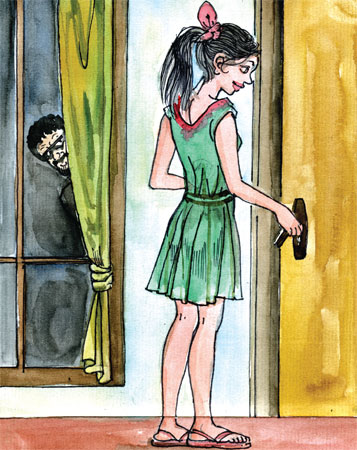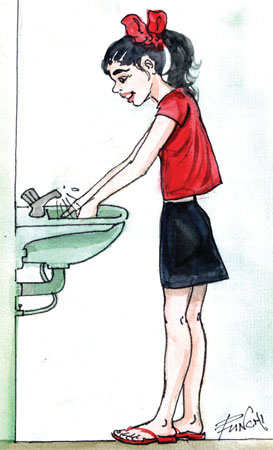|

by R. S. Karunaratne
Learn how to use ‘before’
‘Before’ means “at, or during a time earlier than the thing
mentioned.”
You should wash your hands before meals.
Before leaving for England, he threw a party for his friends.
 |
|
Before the thief could enter the house,
she closed the door. |
Look before you leap. (Proverb)
I am always up before 4 a.m.
Before the thief could enter the house, she closed the door.
Before you take a final decision, seek advice from elders.
We gave a generous tip to the waiter before leaving the hotel.
‘Before’ means “until the event mentioned.”
I got up an hour before the guests arrived.
She said she had never seen me before.
“Have you been here before?” he asked me.
‘Before’ is used to mean “in front of.”
The letter “L” comes before “K” in the alphabet.
Most parents put their children’s needs before their own.
We have three months before us until the course begins.
When I stood before the audience, I felt nervous.
‘Before’ as a preposition
Before signing the document, he read it very carefully.
‘Before’ is used to mean “not later than that date.”
You should apply for the post of instructor before the 30th of April,
2015.
‘Before’ can be used as an adverb in expressions such as “a week
before” or “the day before.”
When we got there, we found out that he had left the day before.
We do not use ‘before’ on its own as an adverb. Use “before this” or
“before that.”
He worked as a journalist and before that he was a salesman.
We do not use “will” with “before.”
Do not say: Before I will leave India, I want to visit the Taj Mahal.
Say: Before I leave India, I want to visit the Taj Mahal.
Beforehand
 |
|
You should wash your hands before meals. |
If you do something beforehand, you do it before you do something
else.
The children had agreed beforehand not to tell anyone else about
their plans for the holidays.
‘Before’ a particular time or date
Amanda was born just before Christmas.
Sam passed the examination before he turned 18.
‘Ago’ and ‘before’
We use ‘ago,’ not ‘before,’ when we say how much time has passed
since something happened.
John died two weeks ago.
We do not use ‘ago’ with verbs in the present perfect tense.
Do not say: The minister has left 10 minutes ago.
Say: The minister left 10 minutes ago.
Match words and meanings
Here’s an exciting way to enrich your vocabulary. Match the words in
column “A” with their meanings in column “B” and check your answers with
the key. The first has been done for you.
[Column A]
T 1. dote
... 2. double-dealing
... 3. double Dutch
... 4. double jeopardy
... 5. double-quick
... 6. double-talk
... 7. double trouble
... 8. double whammy
... 9. doubly
.. 10. doubt
.. 11. doubter
.. 12. doubting Thomas
.. 13. doughty
.. 14. dour
.. 15. douse
.. 16. dovecote
.. 17. dovetail
.. 18. dowdy
.. 19. down-and-out
.. 20. downbeat
.. 21. downcast
.. 22. downer
.. 23. downfall
.. 24. downgrade
.. 25. downhearted
[Column B]
A. the act of putting someone on trial twice for the same crime
B. a small building for doves
C. having no luck, no money and no opportunities
D. dishonest behaviour intended to deceive
E. a situation in which there is twice the number of problems that
usually exist
F. unfriendly, unhappy and very serious
G. a feeling of not being certain about something
H. to cause something to fit exactly together
I. quiet and without much excitement
J. very quickly
K. an event or experience which makes you very unhappy
L. someone who refuses to believe anything until they are shown proof
M. talk or writing that is nonsense
N. sudden destruction of a person, organisation or government and their
loss of power
O. sad and without hope
P. to reduce someone or something to a lower position
Q. unhappy and having no hope
R. not attractive or fashionable
S. twice as much
T. to love someone completely
U. to make something or somebody wet by throwing a lot of liquid over
them
V. determined, brave and unwilling to admit defeat
W. someone who doubts
X. a situation when two unpleasant things happen at the same time
Y. language that has no real meaning or has more than one meaning
Key:
2. D 3. M 4. A 5. J 6. Y 7. E 8. X 9. S 10. G 11. W 12. L 13. V 14. F
15. U 16. B 17. H 18. R 19. C 20. I 21. O 22. K 23. N 24. P 25. Q
Starters
Prepositions - Part 2:
‘In’ and ‘At’ with places
Learn how ‘in’ is used with places.
Stephen is still in the phone box.
Mother is cooking in the kitchen.
 |
|
Maya always looks at herself in the
mirror. |
Father is working in the garden.
Boys are swimming in the pool.
There are 60 seats in the bus.
We took shelter in an abandoned house.
The suspect is in remand prison.
Grandmother is in hospital.
There are many difficult words in the lesson.
There are many typographical errors in the text book.
Your photograph is in the newspaper today.
You are not in this picture.
Many foreigners stay in the country for a short period.
My house is in the middle of a row of houses.
You drive, I'll sit in the back.
Do you like to sit in the front seat?
I had to wait in a long queue to buy a loaf of bread.
Put the milk in the refrigerator.
Is John still in bed?
She got stuck in a traffic jam for half an hour.
We live in an old house.
There is an expensive watch in the showcase.
I have got a pain in my neck.
What's in your hand?
I have something in my ear.
Do you live in London or Liverpool?
Maya always looks at herself in the mirror.
You'll never know what's going on in my mind.
Note how ‘at’ is used in sentences.
Sit at your desk and write the essay.
I always meet her at the supermarket.
A serious accident took place at the crossroads.
The driver patiently waited at the traffic lights.
Does this train stop at Ragama?
The thieves were hiding at a house by the river.
We were at William's when you called.
She lives at No. 50 Galle Road, Bambalapitiya.
All of us danced at the party.
Wait at the Fort Railway Station until I come.
We were welcomed at the Kuala Lumpur Airport.
There is a temple at the top of the hill.
There is a tiny hut at the bottom of the rock.
There is a divan at the back of the room.
We waited at the end of the corridor.
You can buy tickets at the entrance.
The dance at the beginning of the film was brilliant.
I saw her sitting at the dining table.
We were standing at the top of the stairs.
The cat was sleeping at her feet.
There's someone at the door.
We spent the morning at a cricket match.
Give me your phone number at work.
Did you enjoy your stay at university?
Don't disturb him. He's at lunch.
Quiz on idioms
An idiom is a special kind of phrase. It is a group of words which
have a different meaning when used together from the one it would have
if the meaning of each word were taken individually. Tick the meaning of
each idiom and check your answers with the key.
1. If someone is dragged through the mud ...
(a) they are accused of behaving in an immoral way
(b) they are praised for behaving in an exemplary manner
(c) they are dragged along a muddy road
2. If someone is dragging their feet ...
(a) they are walking in an awkward manner
(b) they are considering the best way to solve a problem
(c) they are deliberately delaying making a decision
3. If someone laughs like a drain ...
(a) they laugh happily
(b) they laugh noisily
(c) they laugh quietly
4. If someone comes out of the top drawer ...
(a) they are among the best of their kind
(b) they are among the worst of their kind
(c) they belong to a noble family
5. If two people are considered a dream ticket ...
(a) they are misfits
(b) they are not expected to work well together
(c) they are expected to work well together
6. If you do something like a dream ...
(a) you do it very well
(b) you do it very badly
(c) you are not a professional
7. If an achievement is beyond your wildest dream ...
(a) it is not what you expected
(b) it is unrealistic
(c) it is better than you could have imagined
8. If you refer to someone as the person of your dreams ...
(a) you don't take them seriously
(b) you prefer them to others
(c) you don't like them
9. If someone is dressed up with nowhere to go ...
(a) they are prepared for something but they don't have the
opportunity to do it
(b) they are prepared to go on a journey but they have no destination
(c) they do not know what to do
10. If a woman is dressed to kill ...
(a) she is wearing glamorous clothes
(b) she is badly dressed
(c) she is dressed in fancy clothes
Key:
1. (a) 2. (c) 3. (b) 4. (a) 5. (c) 6. (a) 7. (c) 8. (b) 9. (a) 10.
(a) |

